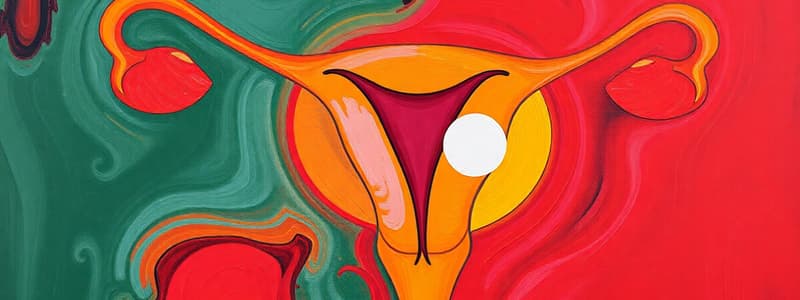Podcast
Questions and Answers
What chromosome count do both egg and sperm cells possess?
What chromosome count do both egg and sperm cells possess?
- 24 chromosomes
- 22 chromosomes
- 23 chromosomes (correct)
- 46 chromosomes
What triggers ovulation during the ovarian cycle?
What triggers ovulation during the ovarian cycle?
- Surge in LH (correct)
- Decline in progesterone
- Increase in FSH
- Surge in estrogen levels
Which hormone is primarily secreted by the corpus luteum?
Which hormone is primarily secreted by the corpus luteum?
- FSH
- Testosterone
- Estrogen
- Progesterone (correct)
What is a likely outcome for a boy whose anterior pituitary no longer releases FSH?
What is a likely outcome for a boy whose anterior pituitary no longer releases FSH?
What occurs during the proliferative phase of the menstrual cycle?
What occurs during the proliferative phase of the menstrual cycle?
What effect does removing the ovaries in a healthy 20-year-old female have on hormone levels?
What effect does removing the ovaries in a healthy 20-year-old female have on hormone levels?
What role does interstitial cells serve in the male reproductive system?
What role does interstitial cells serve in the male reproductive system?
Which of the following best describes the chromosome number reduction during meiosis?
Which of the following best describes the chromosome number reduction during meiosis?
What is the average length of the menstrual cycle in days?
What is the average length of the menstrual cycle in days?
Anabolic steroid injections of testosterone would primarily lead to which of the following changes after three weeks?
Anabolic steroid injections of testosterone would primarily lead to which of the following changes after three weeks?
Flashcards
Gametes
Gametes
Sex cells (sperm and egg) that contain half the number of chromosomes found in other body cells.
Meiosis
Meiosis
The process of cell division that results in four daughter cells, each with half the number of chromosomes as the parent cell.
Ovary
Ovary
The female reproductive organ that produces egg cells.
Ovulation
Ovulation
Signup and view all the flashcards
Progesterone
Progesterone
Signup and view all the flashcards
Endometrium
Endometrium
Signup and view all the flashcards
Proliferative Phase
Proliferative Phase
Signup and view all the flashcards
Secretory Phase
Secretory Phase
Signup and view all the flashcards
Human Chorionic Gonadotropin (hCG)
Human Chorionic Gonadotropin (hCG)
Signup and view all the flashcards
Follicular Phase
Follicular Phase
Signup and view all the flashcards
Study Notes
Gamete Production and Development
- Gametes (egg and sperm) are produced by gonads.
- Egg and sperm cells each have 23 chromosomes.
- A zygote with the genotype "yo" will die.
- A zygote with the genotype "XO" will develop into a female with Turner syndrome.
Menstrual Cycle
- The average length of the menstrual cycle is 28 days.
- During meiosis, the chromosome number is halved during the first meiotic division.
- Mitotic division in germ cells varies by gender.
- Meiosis of one cell produces four gametes in males, one in females.
- Sperm production occurs in the seminiferous tubules.
- Interstitial cells produce androgens.
- Follicle-stimulating hormone (FSH) in males initiates sperm production in the testes.
- The cervix is the neck of the uterus.
- A surge in luteinizing hormone (LH) mid-cycle triggers ovulation.
- The corpus luteum primarily secretes progesterone.
- Menstruation is triggered by a decrease in estrogen and progesterone levels.
- The proliferative phase occurs during days 6-14 of the menstrual cycle.
- The secretory phase occurs during days 15-28 of the menstrual cycle.
Embryo Formation and Pregnancy
- The embryo develops from the inner cell mass of the blastocyst.
- Human chorionic gonadotropin (hCG) is the basis for pregnancy tests.
Ovarian Cycle
- In the follicular phase, the ovary matures a follicle.
Hormonal Regulation and Sterility
- A boy who, after puberty, has insufficient FSH release but normal LH release, will likely be infertile.
- Daily testosterone injections (anabolic steroids) in a bodybuilder will lead to decreased LH, GnRH, and FSH levels after three weeks, along with increased sex drive.
Ovary Removal in Females
- Removal of the ovaries in a healthy 20-year-old female will result in increased blood levels of GnRH, LH, and FSH, and cessation of menstruation.
Studying That Suits You
Use AI to generate personalized quizzes and flashcards to suit your learning preferences.




